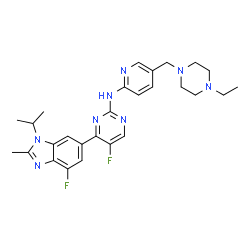Eli Lilly has announced that the neoMONARCH study of abemaciclib, a cyclin-dependent kinase (CDK) 4 and CDK 6 inhibitor, met its primary endpoint of reducing expression of Ki67, a biomarker of cell proliferation, after two weeks of treatment.
“Lilly is committed to the scientific discovery and development of new therapies that change current standards of
cancer care,” said Sue Mahony, Ph.D., senior vice president and president, Lilly Oncology. “The neoMONARCH data are encouraging and continue to inform our understanding of how abemaciclib could be used as both a single-agent therapy or in combination with aromatase inhibitors, such as anastrozole, in the early-stage setting.”

The phase II neoMONARCH trial was a randomized, multicenter, open-label study that enrolled 225 patients who had at least one measurable tumor ≥1 cm, adequate organ function, and an ECOG performance status of ≤1. Patients were randomized to one of three trial arms: 1) twice-daily abemaciclib monotherapy (150mg) for two weeks; 2) twice-daily abemaciclib (150mg) along with once-daily anastrozole (1mg) for two weeks; or 3) once-daily anastrozole monotherapy (1mg) for two weeks. All patients received an initial biopsy prior to randomization to assess baseline Ki67 expression. After the initial two-week treatment period, patients underwent a second tumor biopsy and Ki67 was assessed again.
The primary objective of the study was to assess Ki67 percentage change in the breast tumor after two weeks of therapy from the baseline measurement. The results showed that abemaciclib monotherapy and abemaciclib in combination with anastrozole significantly reduced Ki67 more than anastrozole alone. Following the initial two weeks of randomized treatment, all patients then went on to receive twice-daily abemaciclib (150mg) plus anastrozole (1mg) for a further 14 to 22 weeks.
The study protocol also included the prophylactic use of loperamide (2mg) administered twice-daily, in combination with abemaciclib for the first 28 days. No new safety signals were observed for abemaciclib when administered in combination with anastrozole.
Breast cancer is the most common cancer among American women, besides skin cancers, and is the second leading cause of cancer death among women. An estimated 61,000 cases of early-stage breast cancer will be diagnosed in the U.S. this year and one in eight women, or 12%, of women in the U.S. will develop invasive breast cancer during their lifetime.
Abemaciclib (LY2835219) is an investigational, oral cell cycle inhibitor, designed to block the growth of cancer cells by specifically inhibiting cyclin-dependent kinases, CDK 4 and CDK 6. In many cancers, uncontrolled cell growth arises from a loss of cell cycle regulation due to increased signaling from CDK 4 and CDK 6. Abemaciclib inhibits both CDK 4 and CDK 6, and was shown in cell-free enzymatic assays to be most active against Cyclin D 1 and CDK 4.
In 2015, the FDA granted abemaciclib Breakthrough Therapy Designation based on data from the breast cancer cohort expansion of the company’s phase I trial, JPBA, which studied the efficacy and safety of abemaciclib in women with advanced or metastatic breast cancer. In addition to its current MONARCH clinical trials evaluating abemaciclib in breast cancer, a phase III trial of abemaciclib in lung cancer is also underway.
Friday, December 9, 2016
Source: http://www.centerwatch.com/



